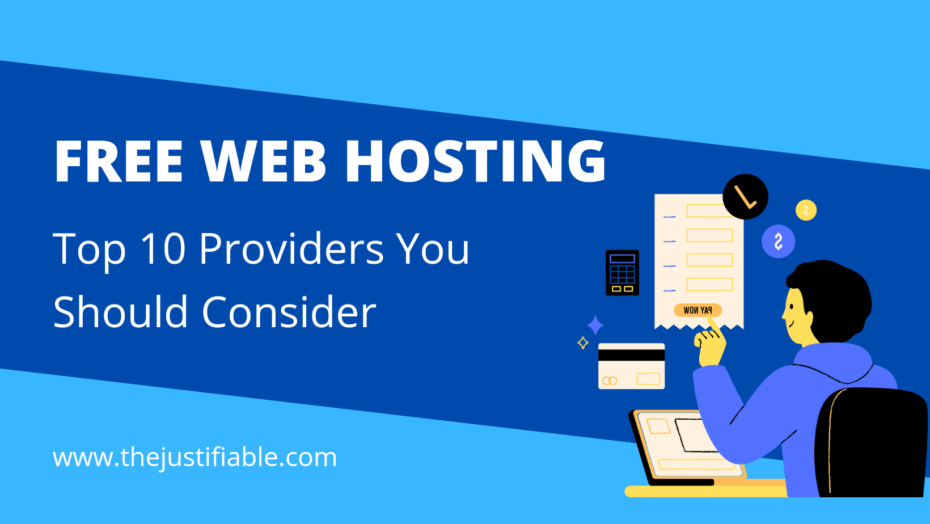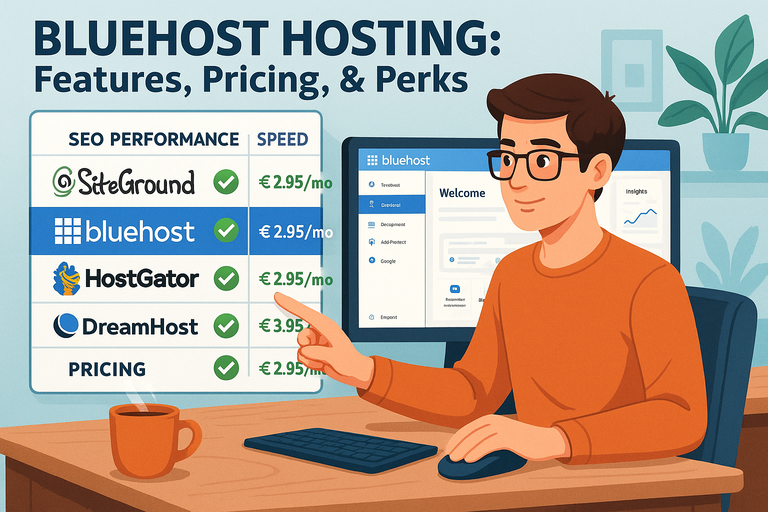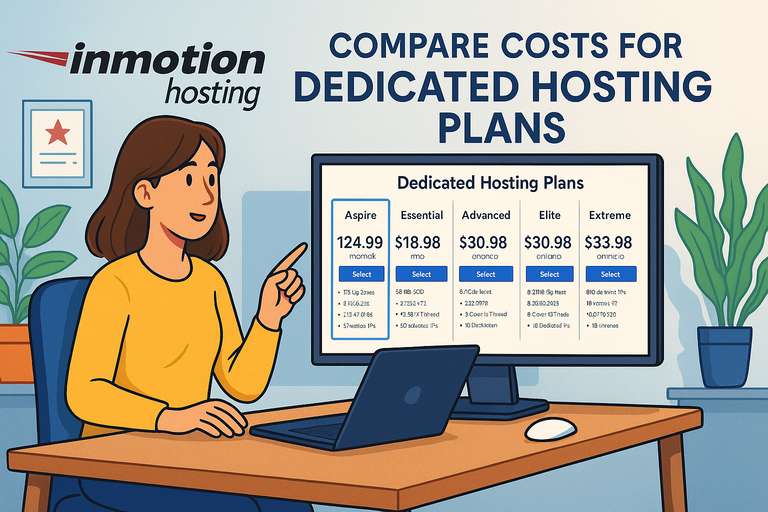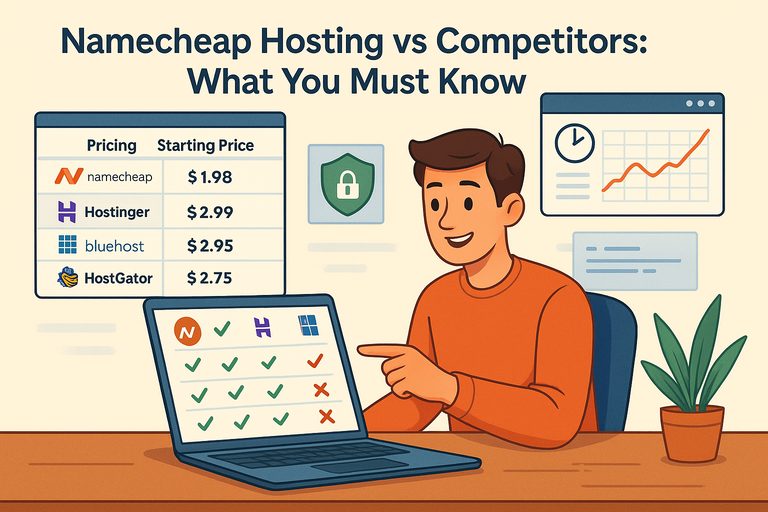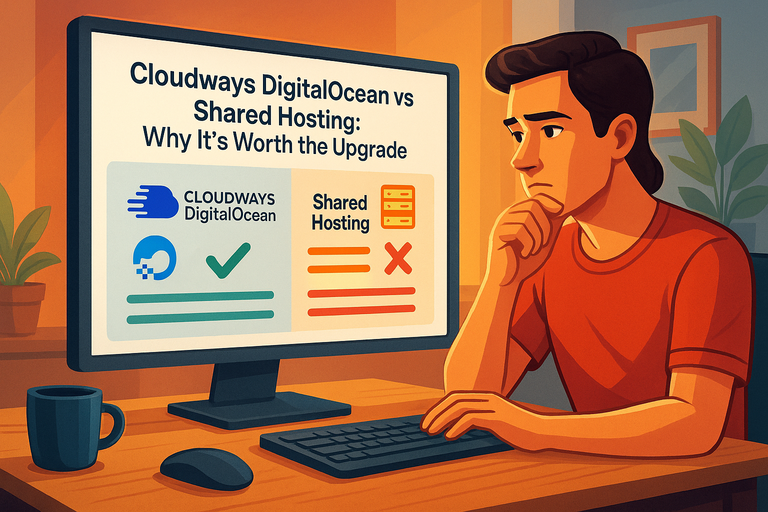Table of Contents
Some links on The Justifiable are affiliate links, meaning we may earn a small commission at no extra cost to you. Read full disclaimer.
Byethost free hosting sounds like a dream—unlimited resources for absolutely $0? It’s a bold claim in a world where most “free” hosting plans come with catches. But is it really as generous as it sounds? What do you actually get, and what’s hiding behind those “unlimited” promises?
If you’ve been wondering whether Byethost can power your website without draining your wallet—or if it’s just another too-good-to-be-true offer—this breakdown covers everything you need to know before jumping in. Let’s take a closer look at what you’re signing up for.
What You Really Get With Byethost Free Hosting
Byethost free hosting looks appealing on the surface, especially when they advertise “unlimited” everything at no cost. But let’s take a closer look at what you’re actually signing up for—and what’s quietly tucked into the fine print.
Understand The Hosting Plan Structure and What’s Actually Free
At first glance, the free plan offers a solid list of features:
- Free subdomain (e.g., yoursite.byethost.com)
- Access to VistaPanel, a custom control panel
- PHP, MySQL, and FTP support
- File manager, online site builder, and error logs
You don’t need to enter any credit card information, and you can start right away. But despite the generous appearance, this plan is designed for hobby sites, testing environments, or very basic web projects.
What you’re getting is a sample of their network—fast enough to be functional but limited enough to make paid plans look like a logical upgrade.
Bandwidth and Disk Space: Are They Truly Unlimited?
The claim of “unlimited” bandwidth and disk space is a major draw. But from what I’ve seen, this is more of a soft cap than a true free-for-all. Here’s how it works:
- There’s no strict numeric cap, but usage is monitored for spikes.
- If your site starts using “too many” resources, it may get throttled or suspended.
- Unlimited doesn’t include large file storage, backups, or video hosting.
Think of it like an “all-you-can-eat” buffet that quietly limits your plate size. You can eat plenty—as long as you don’t draw too much attention.
Performance Limits Hidden in the Fine Print
Hidden limitations affect real-world performance. The hosting runs on shared servers, meaning your website shares space with thousands of others. If someone else’s site spikes, your performance might tank.
There are also background rules like:
- CPU time limits
- Process quotas (how many tasks your site can run at once)
- Restricted cron jobs (scheduled scripts)
All these affect how smoothly your site runs, even if you’re technically within your “unlimited” usage.
Uptime Reliability and Server Speed: What to Expect
Uptime is decent for a free host—usually around 98% to 99%—but that still means potential downtime every few days. Server speed can vary depending on time of day and overall traffic load.
Here’s what I’ve noticed:
- Page load speeds are fine for small, static sites.
- WordPress or dynamic content sites may lag during peak hours.
- No access to a CDN or caching features, unless you set them up manually.
If performance and speed are priorities, especially for business or SEO-heavy sites, you might find the unpredictability frustrating.
Limitations You Need To Know Before Signing Up
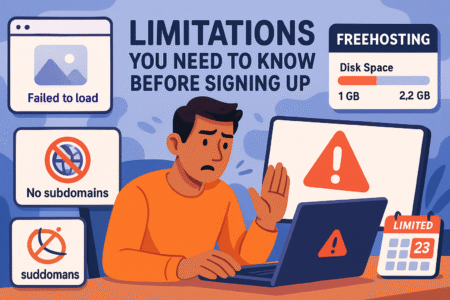
While byethost free hosting can be a useful starting point, there are serious limitations that can derail your project if you’re not aware of them upfront.
Daily Process Limits, File Restrictions, and Auto-Suspensions
This is where most users hit a wall. Daily limits are enforced quietly but strictly:
- Too many PHP executions in a short period = instant suspension
- Uploading .exe, .zip, or even some media files may trigger restrictions
- There’s no warning system—you may find your site suspended without explanation
These measures are in place to protect the shared server, but they’re not always clear until it’s too late.
PHP, MySQL, and Email Limitations That Could Break Your Site
Byethost supports PHP and MySQL, but not at full power:
- Outdated PHP versions might limit compatibility with newer scripts
- Only one MySQL database allowed on the free plan
- No access to remote MySQL connections
- Webmail is offered, but SMTP is unreliable at best
Trying to run a content management system like WordPress or Joomla becomes tricky fast—especially if you rely on plugins or need consistent email delivery.
Lack of Root Access and Custom Configuration Drawbacks
As expected with most free hosts, you don’t get root or SSH access. But there are more subtle limitations too:
- You can’t install your own modules or software
- No access to server configuration files like .htaccess beyond basic edits
- No cron job configuration unless you upgrade
This matters if you plan to scale or use any custom code. The environment is built to keep you within a safe, manageable zone—at the cost of flexibility.
No Free SSL on Free Plans: Why That Matters for SEO and Security
One of the biggest red flags is the absence of free SSL. Here’s why it matters:
- Google flags non-HTTPS sites as “Not Secure,” which kills trust
- Search rankings are directly affected by HTTPS
- You can’t use Let’s Encrypt or install your own certificates on the free plan
- Any attempt to redirect to HTTPS without a valid certificate will throw warnings
For any site that involves user interaction—like logins or forms—this is a dealbreaker. It’s also a serious drawback for affiliate marketers and bloggers trying to rank.
If your goal is to test or learn, these limitations might not matter. But for any serious use, these roadblocks make a strong case for choosing a more robust solution.
Comparing Byethost Free vs Paid Plans: Is It Worth Upgrading?
The free plan gives you a taste, but stepping up to a paid plan can unlock more reliability and control. Let’s explore what changes when you upgrade and whether it’s the right move for your site.
What You Unlock With Their Premium Hosting
Byethost’s premium plans come with noticeable upgrades that solve most of the pain points from the free version:
- Unlimited addon domains and subdomains
- Free SSL certificate included
- No forced ads or branding
- More storage and bandwidth flexibility
- Priority technical support and faster response times
- Access to the popular cPanel interface instead of VistaPanel
You also get Softaculous auto-installer, which makes launching WordPress, Joomla, or Drupal a lot smoother. And unlike the free plan, email and MySQL features are more generous and reliable.
Performance Benchmarks Between Free and Paid Plans
While exact performance data isn’t always public, many users have tested both tiers and noticed clear differences:
- Paid hosting averages better load times due to less crowded servers
- More consistent uptime, often hitting 99.9% or higher
- Dynamic websites run smoother with more CPU allocation
- No sudden account suspensions due to vague “abuse” flags
You’re essentially paying for stability and peace of mind. If your site matters to your business or income, that boost in reliability could be worth every dollar.
Is the Upgrade Cost Justified for Beginners or Small Sites?
Here’s where it depends on your goals. If you’re building your first site or testing things out, free hosting might be enough. But if any of these apply to you, the upgrade makes sense:
- You want a custom domain with SSL for branding and trust
- Your site relies on email or contact forms
- You need better support and faster load times
- You’re tired of being limited by hidden restrictions
Paid plans start at a modest price, often under $5/month, which is fair considering what you get in return. For a beginner serious about growth, it’s a small investment with a big payoff.
How Byethost Makes Money From Its “Free” Users
No business offers free hosting out of pure goodwill. So how does byethost free hosting stay afloat while giving away “unlimited” space? Let’s uncover what’s going on behind the curtain.
Ads, Upsells, and Subtle Monetization Techniques
While your site won’t be plastered with ads (unless you violate terms), the monetization still runs deep:
- Their dashboard promotes paid upgrades regularly
- Users are funneled toward buying domain names and extras
- Free accounts may see referral tracking or promotional links in default settings
It’s a freemium model that gently nudges you toward spending—without being overly aggressive. Still, you’re part of their funnel whether you notice it or not.
Resource Pooling and Overcrowded Shared Servers
The real cost-saving strategy is volume. By pooling thousands of free websites onto shared servers, they spread infrastructure costs thin. This is where things can get tricky:
- High traffic on other sites can slow yours down
- Your account competes for memory, CPU, and bandwidth
- Overloaded servers are more prone to downtime
This setup is ideal for testing and light usage, but not for anyone needing guaranteed performance or uptime.
Hidden Trade-Offs Behind Their Generosity
The biggest trade-off isn’t obvious until you hit a limit:
- Your site may be suspended without warning for vague “abuse” reasons
- Support is minimal or nonexistent for free users
- No clear SLA (service-level agreement), so uptime isn’t guaranteed
By offering just enough to get you started, Byethost makes the upgrade look like a lifeline once you outgrow the free tier. It’s not a trap—but it’s a business strategy.
Real-World Use Cases Where Free Hosting Makes Sense
Despite the limitations, there are times when using byethost free hosting is actually a smart move. It’s all about choosing the right tool for the job.
Hosting Static HTML Pages or Small Projects
If you’re building a resume website, simple landing page, or event site, free hosting can be enough:
- No databases or backend scripting required
- Fast enough for low-traffic pages
- Great for quick one-off projects or short-term need
It’s a zero-cost way to get online fast, especially if you don’t care about a custom domain or branding.
Using It for Learning or Testing Development Environments
I often recommend it to beginners learning how to code or manage a website:
- Easy to upload files via FTP and use PHP/MySQL basics
- Safe environment to experiment without financial risk
- Use the free subdomain to test layout, themes, or plugins
It’s not perfect, but it’s better than running everything locally if you want real-world practice.
Ideal Scenarios Where Reliability Isn’t Mission-Critical
For projects where uptime doesn’t need to be flawless—like internal tools, class projects, or backup sites—this free tier fits nicely. You won’t get the consistency of a paid host, but it’s a useful resource when expectations are low.
Just keep in mind: if you start caring about traffic, SEO, or monetization, upgrading or migrating becomes essential. But for dipping your toes into web hosting, byethost’s free tier can serve its purpose well.
Common User Complaints About Byethost Free Hosting
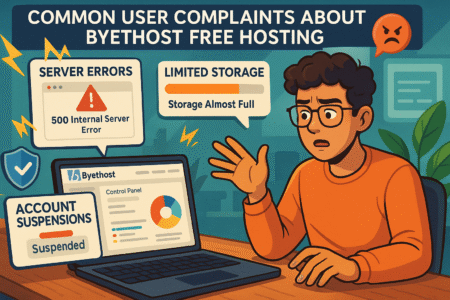
For a service that doesn’t cost anything upfront, byethost free hosting can still come with some frustrating surprises. These user-reported issues are worth knowing before you commit time or content to their platform.
Sudden Account Suspensions Without Warning
This is one of the most common pain points. Users often report their sites being suspended without prior notice or a clear explanation. While the terms of service give Byethost the right to do this for any resource abuse, here’s where it gets tricky:
- There’s no specific usage dashboard to warn you in advance
- Suspension notices often lack detail, making it hard to fix the issue
- Sites may be removed from the server entirely with no backup
For bloggers, freelancers, or anyone hosting something important, this risk alone can make the free plan feel unstable.
Unresponsive or Nonexistent Customer Support
Support is another area where the free plan falls short. You won’t find live chat or direct email support for free users, and the forum system is hit-or-miss:
- Most support threads go unanswered or get vague replies
- There’s no SLA or guaranteed response time
- Technical issues often get redirected to paid upgrades
If you run into problems, you’re largely on your own unless you upgrade or figure out workarounds through external help.
Inconsistent Site Performance During Peak Hours
Because of shared server environments, performance varies wildly. During busy hours or weekends, it’s common to experience:
- Slower load times, even on static pages
- Delayed response from scripts or databases
- Timeout errors when accessing the control panel
This inconsistency can make your site unreliable for visitors, especially if you’re promoting it or relying on it for lead generation.
Top Alternatives If Byethost Isn’t Meeting Your Needs
If you’ve tried byethost free hosting and found it too limited or unstable, there are other free hosting options that might better suit your goals—depending on what you prioritize.
InfinityFree: Same Network, Different Experience
InfinityFree uses the same iFastNet infrastructure as Byethost, but it comes with a more beginner-friendly setup:
- No ads on user sites
- Free SSL with your custom domain
- Unlimited bandwidth and storage under fair use
It still shares some of the same limitations, but their interface is cleaner, and support is slightly more responsive.
000WebHost: Cleaner Interface But With Limits
000WebHost offers a modern dashboard and beginner-friendly onboarding. You’ll get:
- Free subdomain or use your own domain
- Website builder included
- 300 MB disk space and 3 GB bandwidth per month
But beware: they place mandatory footer ads and limit resource usage strictly. Good for basic portfolios, but not high-traffic sites.
AwardSpace and FreeHosting: When You Want More Support
These platforms offer more human customer service and allow you to host your own domain:
- AwardSpace gives 1 GB storage and 5 GB traffic
- FreeHosting.com includes email support and a control panel
They’re more lenient about PHP and database usage, making them viable for small CMS-powered sites.
GitHub Pages and Netlify: For Developers Building Static Sites
If you’re comfortable with code and version control, these are gold:
- GitHub Pages supports static HTML, CSS, and JavaScript
- Netlify adds form handling, deployment previews, and CDN by default
They’re ideal for personal projects, documentation sites, or portfolio pages. And they’re completely ad-free with fast global delivery.
Final Verdict: Is Byethost Free Hosting Really Worth It?
So is byethost free hosting actually worth using? It depends entirely on what you need—and what you’re willing to live without.
Who It’s Best Suited For (And Who Should Avoid It)
This free hosting platform is best for:
- Hobbyists testing websites or learning to use FTP
- Developers experimenting with basic PHP and MySQL
- People building a personal project that won’t go public
On the flip side, it’s not ideal for:
- Business or ecommerce websites
- SEO-driven blogs or affiliate sites
- Anyone needing consistent uptime or custom features
Summary of Strengths vs Deal-Breaking Weaknesses
Here’s a quick rundown:
What it does well:
- Completely free with no credit card needed
- Offers basic tools to launch a real website
- Has a functioning control panel and database access
Where it falls short:
- Suspensions happen with no warning
- No SSL or proper support for free users
- Slow, unreliable performance under load
If your website has any commercial value, these risks can quickly outweigh the savings.
Expert Tip: How to Use It Strategically Without Relying on It Fully
I suggest using byethost free hosting as a sandbox. Set up test environments, prototype your ideas, or use it as a launchpad for migrating to a paid host once things get serious. That way, you get the learning benefit without putting real assets at risk.
If you’re just getting started in web hosting, there’s nothing wrong with trying it out. Just keep your expectations grounded—and your backups saved elsewhere.
I’m Juxhin, the voice behind The Justifiable.
I’ve spent 6+ years building blogs, managing affiliate campaigns, and testing the messy world of online business. Here, I cut the fluff and share the strategies that actually move the needle — so you can build income that’s sustainable, not speculative.

